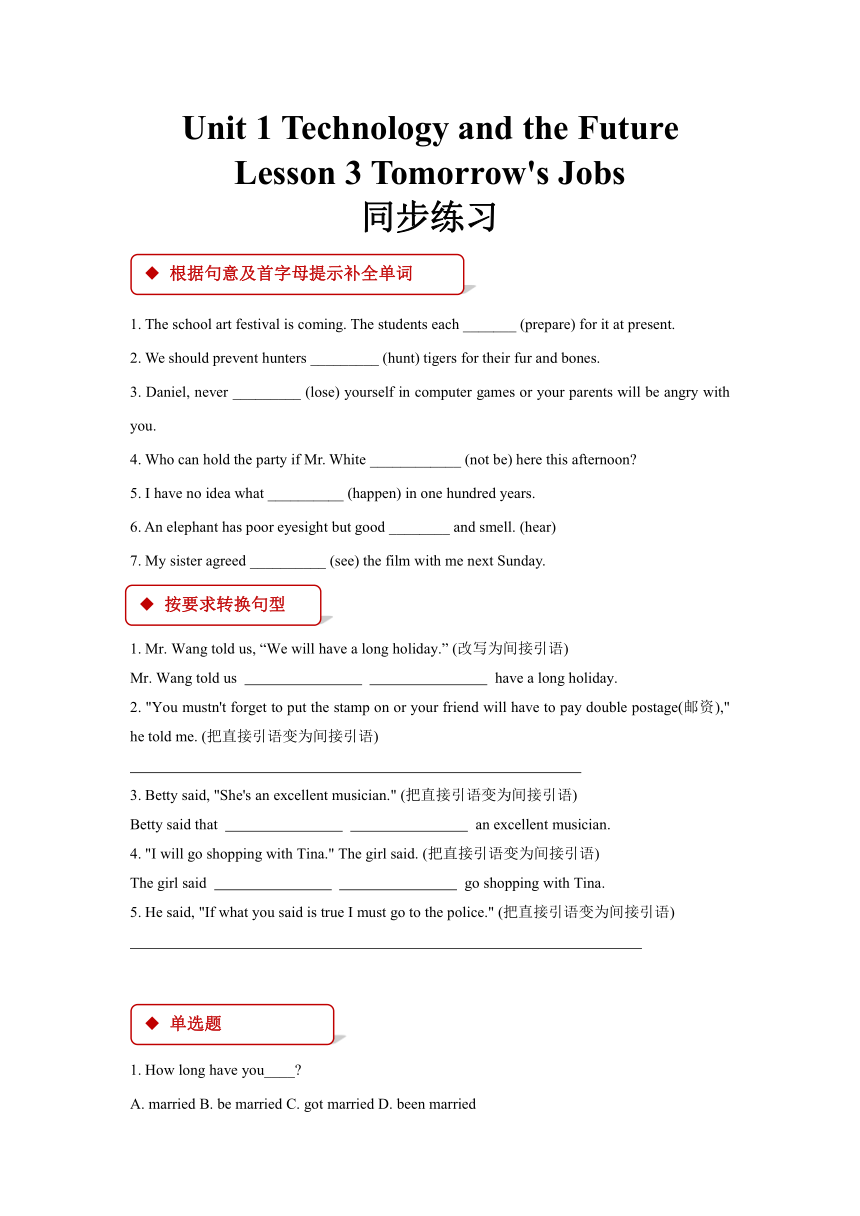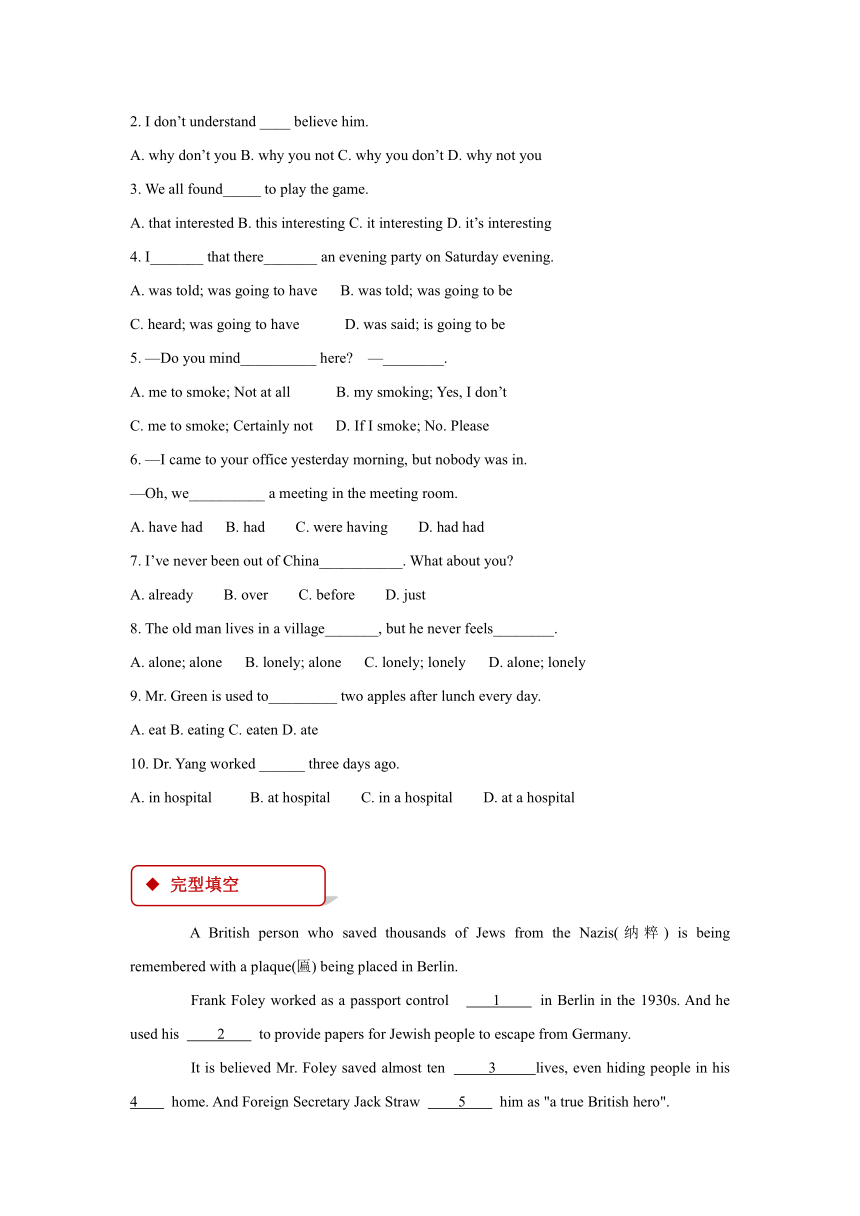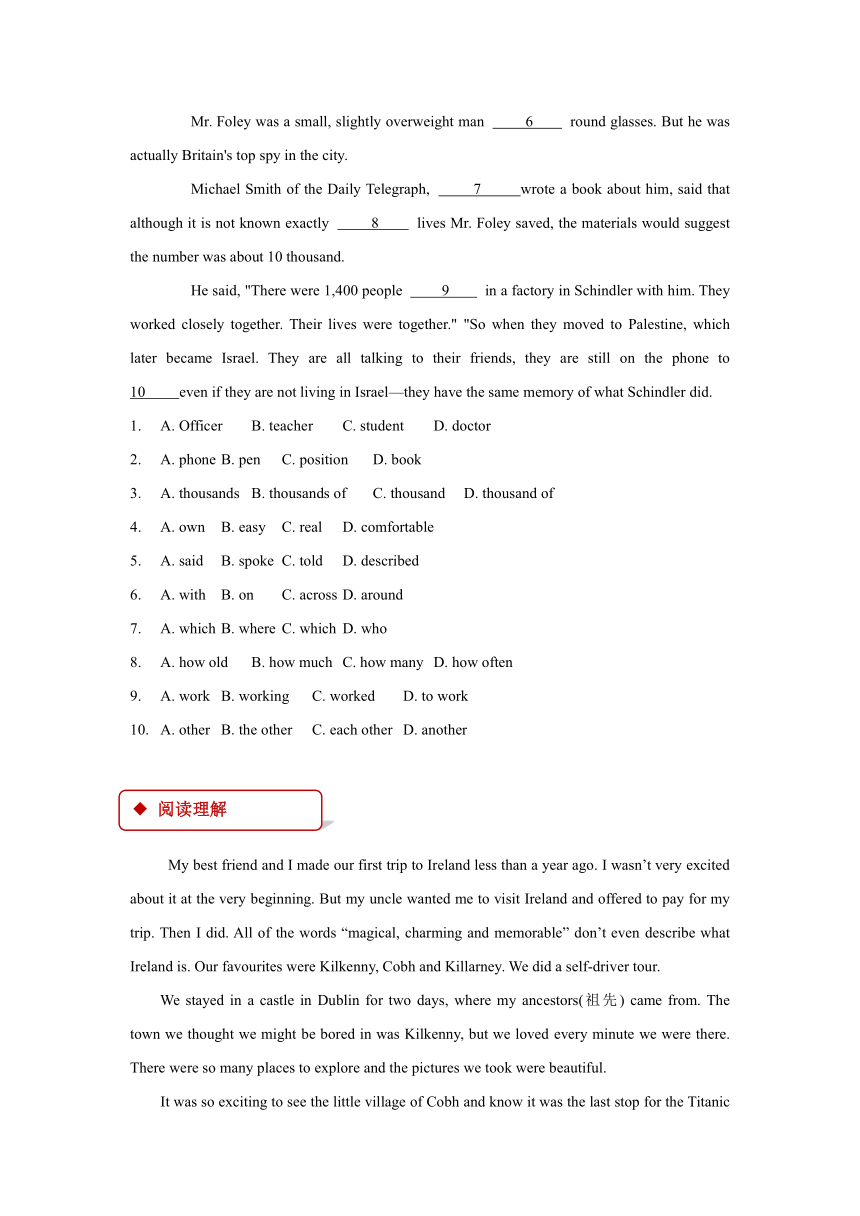Unit 1 Technology and the Future Lesson 3 Tomorrow’s Jobs 同步练习(含答案)
文档属性
| 名称 | Unit 1 Technology and the Future Lesson 3 Tomorrow’s Jobs 同步练习(含答案) |

|
|
| 格式 | zip | ||
| 文件大小 | 13.1KB | ||
| 资源类型 | 教案 | ||
| 版本资源 | 北师大版 | ||
| 科目 | 英语 | ||
| 更新时间 | 2018-07-07 00:00:00 | ||
图片预览



文档简介
Unit 1 Technology and the Future
Lesson 3 Tomorrow's Jobs
同步练习
1. The school art festival is coming. The students each _______ (prepare) for it at present.
2. We should prevent hunters _________ (hunt) tigers for their fur and bones.
3. Daniel, never _________ (lose) yourself in computer games or your parents will be angry with you.
4. Who can hold the party if Mr. White ____________ (not be) here this afternoon?
5. I have no idea what __________ (happen) in one hundred years.
6. An elephant has poor eyesight but good ________ and smell. (hear)
7. My sister agreed __________ (see) the film with me next Sunday.
1. Mr. Wang told us, “We will have a long holiday.” (改写为间接引语)
Mr. Wang told us ? ? have a long holiday.
2. "You mustn't forget to put the stamp on or your friend will have to pay double postage(邮资)," he told me. (把直接引语变为间接引语)
?
3. Betty said, "She's an excellent musician." (把直接引语变为间接引语)
Betty said that ? ? an excellent musician.
4. "I will go shopping with Tina." The girl said. (把直接引语变为间接引语)
The girl said ? ? go shopping with Tina.
5. He said, "If what you said is true I must go to the police." (把直接引语变为间接引语)
?
1. How long have you____?
A. married B. be married C. got married D. been married
2. I don’t understand ____ believe him.
A. why don’t you B. why you not C. why you don’t D. why not you
3. We all found_____ to play the game.
A. that interested B. this interesting C. it interesting D. it’s interesting
4. I_______ that there_______ an evening party on Saturday evening.
A. was told; was going to have B. was told; was going to be
C. heard; was going to have D. was said; is going to be
5. —Do you mind__________ here? —________.
A. me to smoke; Not at all B. my smoking; Yes, I don’t
C. me to smoke; Certainly not D. If I smoke; No. Please
6. —I came to your office yesterday morning, but nobody was in.
—Oh, we__________ a meeting in the meeting room.
A. have had B. had C. were having D. had had
7. I’ve never been out of China___________. What about you?
A. already B. over C. before D. just
8. The old man lives in a village_______, but he never feels________.
A. alone; alone B. lonely; alone C. lonely; lonely D. alone; lonely
9. Mr. Green is used to_________ two apples after lunch every day.
A. eat B. eating C. eaten D. ate
10. Dr. Yang worked ______ three days ago.
A. in hospital B. at hospital C. in a hospital D. at a hospital
A British person who saved thousands of Jews from the Nazis(纳粹) is being remembered with a plaque(匾) being placed in Berlin.
Frank Foley worked as a passport control 1 ? in Berlin in the 1930s. And he used his 2 ? to provide papers for Jewish people to escape from Germany.
It is believed Mr. Foley saved almost ten 3 ? lives, even hiding people in his 4 ? home. And Foreign Secretary Jack Straw 5 ? him as "a true British hero".
Mr. Foley was a small, slightly overweight man 6 ? round glasses. But he was actually Britain's top spy in the city.
Michael Smith of the Daily Telegraph, 7 ? wrote a book about him, said that although it is not known exactly 8 ? lives Mr. Foley saved, the materials would suggest the number was about 10 thousand.
He said, "There were 1,400 people 9 ? in a factory in Schindler with him. They worked closely together. Their lives were together." "So when they moved to Palestine, which later became Israel. They are all talking to their friends, they are still on the phone to 10 ? even if they are not living in Israel—they have the same memory of what Schindler did.
1. A. Officer B. teacher C. student D. doctor
2. A. phone B. pen C. position D. book
3. A. thousands B. thousands of C. thousand D. thousand of
4. A. own B. easy C. real D. comfortable
5. A. said B. spoke C. told D. described
6. A. with B. on C. across D. around
7. A. which B. where C. which D. who
8. A. how old B. how much C. how many D. how often
9. A. work B. working C. worked D. to work
10. A. other B. the other C. each other D. another
My best friend and I made our first trip to Ireland less than a year ago. I wasn’t very excited about it at the very beginning. But my uncle wanted me to visit Ireland and offered to pay for my trip. Then I did. All of the words “magical, charming and memorable” don’t even describe what Ireland is. Our favourites were Kilkenny, Cobh and Killarney. We did a self-driver tour.
We stayed in a castle in Dublin for two days, where my ancestors(祖先) came from. The town we thought we might be bored in was Kilkenny, but we loved every minute we were there. There were so many places to explore and the pictures we took were beautiful.
It was so exciting to see the little village of Cobh and know it was the last stop for the Titanic (a famous ship) at that time. We loved the visitor centre there and the little shops. We never got any bad food there. It was so mouth-watering at every stop! And when we stayed in Westmeath, we saw the Trim Castle through the windows and found some scenes from Brave Heart which was filmed there. We were so excited. Again, more beautiful pictures were taken in that tiny town.
We love the country, the people, the food and the magic. We would go back very soon. I was so thankful for my uncle who had given me the chance to be there.
I have no words to adequately describe our trip. Go, explore the small villages, eat and enjoy! I still look at my pictures and can’t believe I was actually there.
1. What can we learn from the first paragraph?
A. The writer showed great interest in visiting Ireland at first.
B. It was the first time for the writer to visit Ireland.
C. The writer went to Ireland with his uncle.
D. The car was driven by the writer’s uncle.
2. Which of the following could best show that the writer was really interested in Kilkenny?
A. There were so many strangers there to meet. B. There were so many beautiful pictures there to take.
C. We thought we might be bored in Kilkenny. D. We loved every minute we were there.
3. What can we know from the third paragraph?
A. The Titanic was filmed in Cobh. B. The food in Cobh was delicious.
C. The writer knew nothing about Brave Heart. D. The writer visited the Trim Castle alone.
4. What does the underlined word “adequately” in the last paragraph mean?
A. properly B. strongly C. warmly D. surprisingly
5. Where does the article most probably come from?
A. A scientific fiction. B. A tourist magazine. C. A poem. D. A poster.
参考答案
are preparing
hunting
lose
isn’t
will happen
hearing
to see
1. they would
2. He told me that I mustn't forget to put the stamp on or my friend would have to pay double postage.
3. she was
4. she would
5. He told me if what I had said was true he must go to the police.
1.?D?
2.?C?
3.?C?
4.?B?
5.?D?
6.C?
7.?C?
8. D?
9.?B?
10.?C
1. B
2. C
3. A
4. D
5. C
6. A
7. B
8. C
9. D
10. A
1.?B?
2.?D?
3.?A?
4.?B?
5.?C
Lesson 3 Tomorrow's Jobs
同步练习
1. The school art festival is coming. The students each _______ (prepare) for it at present.
2. We should prevent hunters _________ (hunt) tigers for their fur and bones.
3. Daniel, never _________ (lose) yourself in computer games or your parents will be angry with you.
4. Who can hold the party if Mr. White ____________ (not be) here this afternoon?
5. I have no idea what __________ (happen) in one hundred years.
6. An elephant has poor eyesight but good ________ and smell. (hear)
7. My sister agreed __________ (see) the film with me next Sunday.
1. Mr. Wang told us, “We will have a long holiday.” (改写为间接引语)
Mr. Wang told us ? ? have a long holiday.
2. "You mustn't forget to put the stamp on or your friend will have to pay double postage(邮资)," he told me. (把直接引语变为间接引语)
?
3. Betty said, "She's an excellent musician." (把直接引语变为间接引语)
Betty said that ? ? an excellent musician.
4. "I will go shopping with Tina." The girl said. (把直接引语变为间接引语)
The girl said ? ? go shopping with Tina.
5. He said, "If what you said is true I must go to the police." (把直接引语变为间接引语)
?
1. How long have you____?
A. married B. be married C. got married D. been married
2. I don’t understand ____ believe him.
A. why don’t you B. why you not C. why you don’t D. why not you
3. We all found_____ to play the game.
A. that interested B. this interesting C. it interesting D. it’s interesting
4. I_______ that there_______ an evening party on Saturday evening.
A. was told; was going to have B. was told; was going to be
C. heard; was going to have D. was said; is going to be
5. —Do you mind__________ here? —________.
A. me to smoke; Not at all B. my smoking; Yes, I don’t
C. me to smoke; Certainly not D. If I smoke; No. Please
6. —I came to your office yesterday morning, but nobody was in.
—Oh, we__________ a meeting in the meeting room.
A. have had B. had C. were having D. had had
7. I’ve never been out of China___________. What about you?
A. already B. over C. before D. just
8. The old man lives in a village_______, but he never feels________.
A. alone; alone B. lonely; alone C. lonely; lonely D. alone; lonely
9. Mr. Green is used to_________ two apples after lunch every day.
A. eat B. eating C. eaten D. ate
10. Dr. Yang worked ______ three days ago.
A. in hospital B. at hospital C. in a hospital D. at a hospital
A British person who saved thousands of Jews from the Nazis(纳粹) is being remembered with a plaque(匾) being placed in Berlin.
Frank Foley worked as a passport control 1 ? in Berlin in the 1930s. And he used his 2 ? to provide papers for Jewish people to escape from Germany.
It is believed Mr. Foley saved almost ten 3 ? lives, even hiding people in his 4 ? home. And Foreign Secretary Jack Straw 5 ? him as "a true British hero".
Mr. Foley was a small, slightly overweight man 6 ? round glasses. But he was actually Britain's top spy in the city.
Michael Smith of the Daily Telegraph, 7 ? wrote a book about him, said that although it is not known exactly 8 ? lives Mr. Foley saved, the materials would suggest the number was about 10 thousand.
He said, "There were 1,400 people 9 ? in a factory in Schindler with him. They worked closely together. Their lives were together." "So when they moved to Palestine, which later became Israel. They are all talking to their friends, they are still on the phone to 10 ? even if they are not living in Israel—they have the same memory of what Schindler did.
1. A. Officer B. teacher C. student D. doctor
2. A. phone B. pen C. position D. book
3. A. thousands B. thousands of C. thousand D. thousand of
4. A. own B. easy C. real D. comfortable
5. A. said B. spoke C. told D. described
6. A. with B. on C. across D. around
7. A. which B. where C. which D. who
8. A. how old B. how much C. how many D. how often
9. A. work B. working C. worked D. to work
10. A. other B. the other C. each other D. another
My best friend and I made our first trip to Ireland less than a year ago. I wasn’t very excited about it at the very beginning. But my uncle wanted me to visit Ireland and offered to pay for my trip. Then I did. All of the words “magical, charming and memorable” don’t even describe what Ireland is. Our favourites were Kilkenny, Cobh and Killarney. We did a self-driver tour.
We stayed in a castle in Dublin for two days, where my ancestors(祖先) came from. The town we thought we might be bored in was Kilkenny, but we loved every minute we were there. There were so many places to explore and the pictures we took were beautiful.
It was so exciting to see the little village of Cobh and know it was the last stop for the Titanic (a famous ship) at that time. We loved the visitor centre there and the little shops. We never got any bad food there. It was so mouth-watering at every stop! And when we stayed in Westmeath, we saw the Trim Castle through the windows and found some scenes from Brave Heart which was filmed there. We were so excited. Again, more beautiful pictures were taken in that tiny town.
We love the country, the people, the food and the magic. We would go back very soon. I was so thankful for my uncle who had given me the chance to be there.
I have no words to adequately describe our trip. Go, explore the small villages, eat and enjoy! I still look at my pictures and can’t believe I was actually there.
1. What can we learn from the first paragraph?
A. The writer showed great interest in visiting Ireland at first.
B. It was the first time for the writer to visit Ireland.
C. The writer went to Ireland with his uncle.
D. The car was driven by the writer’s uncle.
2. Which of the following could best show that the writer was really interested in Kilkenny?
A. There were so many strangers there to meet. B. There were so many beautiful pictures there to take.
C. We thought we might be bored in Kilkenny. D. We loved every minute we were there.
3. What can we know from the third paragraph?
A. The Titanic was filmed in Cobh. B. The food in Cobh was delicious.
C. The writer knew nothing about Brave Heart. D. The writer visited the Trim Castle alone.
4. What does the underlined word “adequately” in the last paragraph mean?
A. properly B. strongly C. warmly D. surprisingly
5. Where does the article most probably come from?
A. A scientific fiction. B. A tourist magazine. C. A poem. D. A poster.
参考答案
are preparing
hunting
lose
isn’t
will happen
hearing
to see
1. they would
2. He told me that I mustn't forget to put the stamp on or my friend would have to pay double postage.
3. she was
4. she would
5. He told me if what I had said was true he must go to the police.
1.?D?
2.?C?
3.?C?
4.?B?
5.?D?
6.C?
7.?C?
8. D?
9.?B?
10.?C
1. B
2. C
3. A
4. D
5. C
6. A
7. B
8. C
9. D
10. A
1.?B?
2.?D?
3.?A?
4.?B?
5.?C
同课章节目录
- Unit 1 Technology and the Future
- Lesson 1 Schools of the Future
- Lesson 2 Online Life
- Lesson 3 Tomorrow's Jobs
- Communication Workshop
- Unit 2 Communication
- Lesson 4 Animal Talk
- Lesson 5 Meeting People
- Lesson 6 The Texting Generation
- Communication Workshop
- Unit 3 Festivals and Holidays
- Lesson 7 Chinese New Year
- Lesson 8 A Picnic
- Lesson 9 Thanksgiving
- Communication Workshop
- Unit 4 Dealing with Problems
- Lesson 10 Problem Page
- Lesson 11 Online Time
- Lesson 12 Generation Gap
- Communication Workshop
- Unit 5 Memories
- Lesson 13 A Daughter's Letter
- Lesson 14 Grandpa's Memories
- Lesson 15 Life in the 1950s
- Communication Workshop
- Unit 6 Detectives
- Lesson 16 A Detective Story (I)
- Lesson 17 A Detective Story (II)
- Lesson 18 The Mystery Writer
- Communication Workshop
